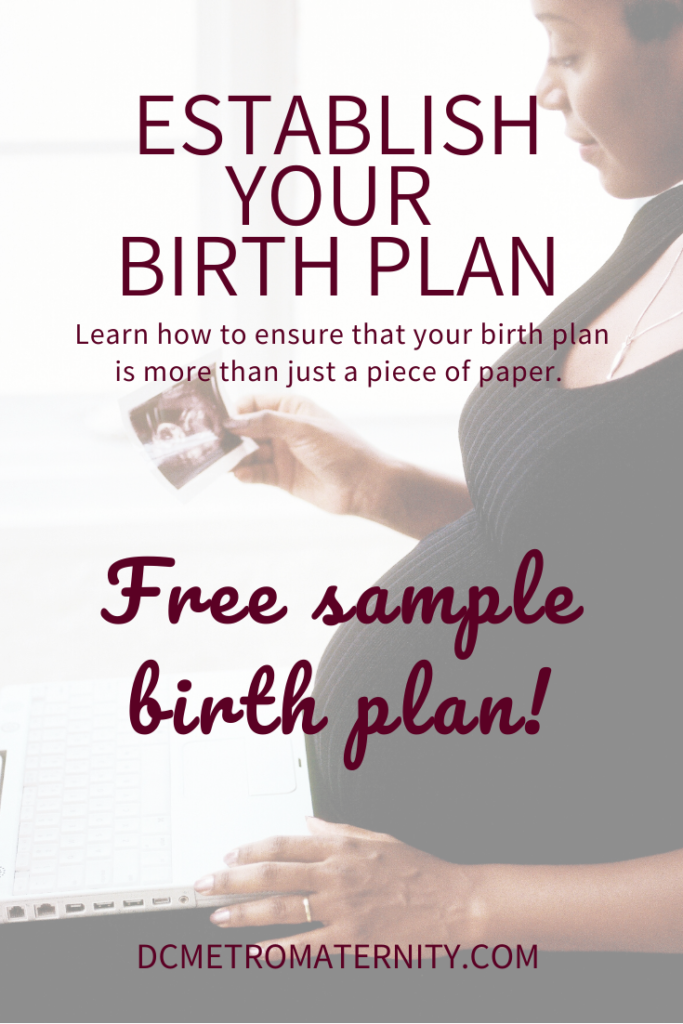You’re pregnant, and your due date is approaching. The closer you get, the more advice you hear about how to get through labor and birth. Repeatedly, people ask you, “So have you written a birth plan, yet?”
But everybody skips a step by asking you that. How do you write a birth plan, if you don’t know what should go on it?
What we’ve learned as labor doulas in the DC metro area is that birth plans aren’t really about what’s on a piece of paper. If pieces of paper fixed everything, the world would be a different place.
You need to do more than just download a birth plan template from the internet and fill it out (although we do have a birth plan sample available below!). Instead, you need to establish your birth plan and create a situation that will make the birth you desire more possible.
Want to know what I mean? Here are the steps:
- Determine your birth philosophy.
- Choose your provider & birthplace.
- Decide who will be with you in labor & birth.
- Account for the unexpected.
Determine your birth philosophy.
You get to decide what’s important to you for your birth, and this knowledge can guide everything else. Most of us are on a spectrum between two extremes when considering childbirth.
- Some people believe that birth is natural and safe. If you hold this belief, it usually means that you believe it should be undisturbed and women’s bodies are designed to birth their babies. These expectant parents tend to gravitate toward what many call natural childbirth (which means unmedicated, vaginal birth).
- Other people believe that birth should be medically managed. This often means that you want to be monitored closely and have the assistance of a medical provider every step of the way. These expectant parents are more comfortable with medical interventions that they believe will keep them and their babies safe.
There are completely valid reasons for each belief system and your DC Metro Maternity labor doula will support you through either. There’s no right or wrong answer when it comes to whether natural childbirth (an unmedicated birth), a more medical approach is right for you.
You can have a labor doula for any sort of birth, including a planned cesarean or induction birth.
Most of our clients fall somewhere in between, and the truth is that the experiences of your friends and family, and your own reproductive health (especially related to conception and fertility) could matter a lot here.
As labor doulas, we don’t make this choice for you, and can’t determine your right birth plan. We just encourage you to think about what’s important to you in childbirth, because everything else flows from these beliefs.
Things that show up on birth plan templates like: when to go to the hospital in labor, whether you should get an epidural are the details that come out of this philosophy.
For example: a decision about an epidural is not only about pain management. It’s also about if you think that birth for you is best done in the hospital bed or at home, if freedom to move is important to you and what you think of monitoring you and your baby during labor.
Choose your provider & your birthplace.
One of the most effective ways to set yourself up for birth that you feel good about is to plan to birth with a medical provider that you feel safe with, in a place that aligns with your philosophy.
Some people choose their provider first.
And note that we do say choose your provider. All too often, women give birth with the OB (or sometimes nurse midwife) that has been providing their GYN care since their very first pap smear, without considering what they want from their birth. If a long term relationship is the most important thing to you, then you’re set! On the other hand, if you find that you have strong opinions or a definite philosophy, you could choose to interview an obstetrician or midwife. By interviewing the person providing your prenatal care, you find out if you all are on the same page about how your pregnancy should be managed.
The questions that you ask will depend on what’s important to you (which is why considering your birth philosophy is important.) You might ask a provider questions like:
- How do you manage high risk and low-risk pregnancies?
- What testing and ultrasounds are standard in your practice? What if I prefer to opt-out of a procedure?
- How many providers are in the practice? Will I meet everyone throughout my pregnancy? How will I know who is likely to be present when you deliver my baby?
- What is your vaginal delivery rate? And your cesarean rate?
- What do you think about natural childbirth (or unmedicated birth)?
- At which hospital(s) do you attend deliveries?
*If you’re a Black woman that is specifically concerned about maternal mortality, then read this blog about how to talk to your OBGYN or midwife and address these concerns as a part of your birth plan.
If you have a provider that you intend to work with, that will usually determine your birthplace, as each provider only attends births at some hospitals or a particular birth center.
On the other hand, you may have a specific hospital in mind where you want to deliver.
Every hospital’s labor and delivery unit is not the same.
Different hospitals have varying policies. The certified labor doulas at DC Metro Maternity are familiar with local hospitals and can help you answer questions about what birth is like at your potential birthplace in the DC metro area, and if it aligns with the birth plan you are establishing. Our labor doulas have researched hospitals in DC, MD and VA can help you learn things like:
- If your hospital has amenities that can support unmedicated labor such as birth tubs & wireless monitoring
- What medical pain relief options are available (only an epidural? nitrous oxide?)
- If there is lactation support to improve early breastfeeding
- Whether a hospital’s procedures support skin to skin and/or the golden hour for bonding after birth
We also recommend taking a tour of your hospital’s labor and delivery unit. Most every hospital in the DC metro area offers them, and you should ask these questions on your hospital tour.
Decide who will be in the room with you.
So you’ve considered your birth philosophy, chosen your OBGYN or midwife, and the hospital, birth center or home where you’ll have your baby. Now you need to decide who will be with you during your labor and delivery.
Students in our birth classes are usually surprised to learn that for most of their labor, they won’t see their doctor.
Loved ones that you invite, and your labor and delivery nurses are with you throughout your time in the hospital. Your OB is likely to only be physically present for a small portion of the time you’re in labor, especially during pushing and delivery of the baby and placenta. Midwives tend to be more present in DC metro hospitals, but are not usually a constant presence.
This is one of the key reasons that women choose to hire a professional labor doula. If you want the consistent presence of a birth professional, who you’ve met prior to birth, you want a doula.
You also want to be intentional about which family and friends are with you during labor & birth.
A joke that we make is “Would you be comfortable with this person watching you poop?”
You personally may or may not poop during pushing in a vaginal birth, but the point stands- who is going to make you comfortable in your birth room?
Think back to your birth philosophy. Who will support this birth plan you’re establishing? Before inviting loved ones, consider:
- Do they tend to respect your wishes or will you be managing their feelings during your birth?
- Will this person make you self conscious during birth?
- Do they have their own birth “stuff” to deal with?
- Will more people in the room distract you as you try to manage contractions, rest with your epidural, or make any medical decisions?
Whether you believe it’s sacred or a medical event, many times women have a hard time carrying out their birth plan when labor becomes a spectator sport.

Account for the unexpected in your birth plan.
For most expectant parents, there are certain things that they definitely do not want to happen during their birth. Maybe you want to avoid birthing without an epidural, or cesarean birth (c-section). It could be that induction, or some other procedure freaks you out.
Depending on the sort of person you are, and how you handle the unknown, there are two temptations with things that we want to avoid in birth:
- Never speak of this terrible thing that could happen
- Focus all of our attention on researching how to prevent it
Both of these reactions are based in fear. Fear of childbirth is super common, so however you’ve been coping is fine. But the truth is that tension and fear doesn’t really help you get a baby out of your body.
We recommend making a plan for how to deal with the unexpected. Find out what options you have with your provider and hospital or birth center when it comes to:
- A scheduled or urgent cesarean birth plan
- Managing pushing to reduce tearing
- An induction of labor
- Anything else that you’re worried about
Put it in your birth plan as a plan B or C. And then don’t fixate on it. You’ve dealt with the concern. You’re being smart and brave. (And if you do find yourself still fearful, use the techniques in this post to manage it.)
Now, fill out a birth plan template.
After you’ve taken all the steps above, that checklist should be a piece of cake. You have a good sense of what you want, as well as a birth team (loved ones, medical provider and a doula) who support you. You’ve established your birth plan and set yourself up for an empowering experience.
Be sure to learn more about labor doulas here.


